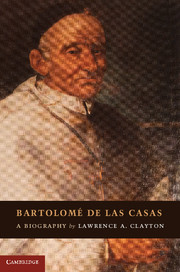Book contents
- Frontmatter
- Contents
- Figures
- Introduction
- 1 Seville and Early Modern Spain
- 2 To the Indies
- 3 The Genesis of the Black Legend
- 4 Conversion
- 5 Protector of the Indians
- 6 “Micer” Las Casas at Court Looking for Good Spanish Peasants
- 7 Las Casas the Political Animal
- 8 Catastrophe in Tierra Firme and the “Long Sleep” in Puerto Plata
- 9 Coming Out to Battle
- 10 The New Laws
- 11 Bishop of Chiapas
- 12 The Great Debate
- 13 Court Activist and Historian
- 14 The Final Fights
- Conclusion
- Epilog
- Bibliographical Essay
- Index
- References
5 - Protector of the Indians
Published online by Cambridge University Press: 05 November 2012
- Frontmatter
- Contents
- Figures
- Introduction
- 1 Seville and Early Modern Spain
- 2 To the Indies
- 3 The Genesis of the Black Legend
- 4 Conversion
- 5 Protector of the Indians
- 6 “Micer” Las Casas at Court Looking for Good Spanish Peasants
- 7 Las Casas the Political Animal
- 8 Catastrophe in Tierra Firme and the “Long Sleep” in Puerto Plata
- 9 Coming Out to Battle
- 10 The New Laws
- 11 Bishop of Chiapas
- 12 The Great Debate
- 13 Court Activist and Historian
- 14 The Final Fights
- Conclusion
- Epilog
- Bibliographical Essay
- Index
- References
Summary
Some Bases for Las Casas’s Defense of the Indians’ Dominion and Sovereignty
Having preached his sermon and crossed his Rubicon, Las Casas preached a number of other sermons and then set off for Spain. “I did not have a penny to my name, except for an old mare that may have been worth one hundred pesos.” Nonetheless “I decided to go to Castile and inform the King, requesting, and insisting upon, a remedy for such obvious wrongs.” Boldness and vision were never lacking in Las Casas’s persona.
What was the wellspring of Las Casas’s immense compassion for and commitment to the rights of Amerindians? What drove him, other than being an eyewitness to the process of decimation? In this experience, after all, he was merely one of hundreds, and later thousands, of other Spaniards who crossed the ocean and saw – and did – the same things Las Casas witnessed. With the exception of a handful of Dominicans and Franciscans, few of them evolved into such passionate advocates as Las Casas.
He eventually became extremely well-read in canon law. In later writings, especially his Defense of the Amerindians written sometime between 1548 and 1550 for a celebrated debate with Juan Ginés de Sepúlveda over the justness of the conquest and the nature of the American Indians, Las Casas drew heavily from four sources. These were the Bible, theologians, canon and Roman civil law, and Aristotle (384–322 BC). Las Casas leaned especially heavily on his fellow Dominican, St. Thomas Aquinas (1225–1274). The writings of St. Augustine of Hippo (354–430) come in second if we count citations in Las Casas’s Defense.
- Type
- Chapter
- Information
- Bartolomé de las CasasA Biography, pp. 82 - 120Publisher: Cambridge University PressPrint publication year: 2012



